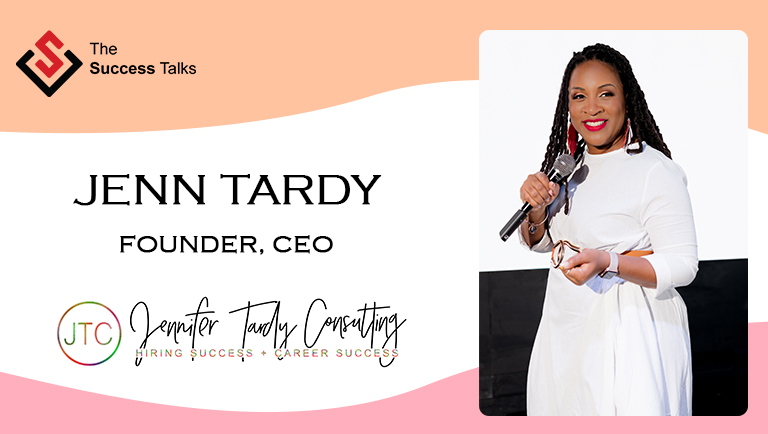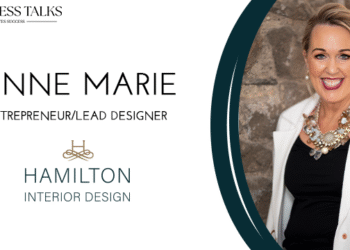“Normalize Diversity Recruiting,” Entrepreneur Jenn Tardy
In today’s feature, we introduce you to entrepreneur Jenn Tardy and her experiences with her business, along with her mission to normalize diversity recruiting. Let’s dive in.
Jennifer Tardy Consulting, or Team JTC, is a training and consulting firm specializing in diversity recruiting and retention. Run by an entrepreneur who believes she is at the intersection of her multiple identities as a black woman and a mother of two active, inquisitive boys, she is working to help employers increase diversity “without harm.” Her vision is to normalize diversity recruiting and representation so that all workplaces can realize the value of Lived Experience Intelligence. As our conversation continued, we were curious to learn more about what “without harm” precisely meant for an organization. Jenn humbly explained: “without harm” means:
Without using language that “marks” or “others” individuals from historically underrepresented groups, Without leaving employees secretly feeling like they are discriminating against cis-gender, able-bodied, heterosexual white men, Without making recruiters the villain or the hero in the initiative to increase diversity, Without centering the work of increasing diversity just on the recruiting team (or just with diversity recruiters), Without tokenizing individuals from historically underrepresented groups, without hiring people based on how they identify ,Without insinuating a need to hire people who are unqualified to do the work successfully (or “hiring for potential”).
Without ignoring or hiding demographic hiring and employment data, Without outsourcing the inner work to technology (i.e., artificial intelligence),Without outsourcing diversity recruiting solely to agency recruiters, Without feeling a personal sense of confusion, resistance, or discomfort, Without sitting behind a computer making assumptions about how a person identifies
Many workplaces focused on increasing diversity often approach the work ineffectively, ultimately causing harm in the process. The unique advantage that JTC provides is they deliver the work without creating harm in the process. Along with consulting services, Jenn also runs a podcast that left us wanting more.
“But What About Me?” Podcast
When certain groups are available in the workforce but not well represented in your workplace, it means they are underrepresented in your workplace. Historically, women, people of color, people with disabilities, veterans, and people who identify as LGBTQIA+ have been historically underrepresented in the workplace. Jenn speaks for them and shares valuable information to help them represent themselves while also assisting recruiters in hiring professionals from diverse backgrounds. Here’s how Jenn further elaborated on the recruitment process.
Diversity in Recruitment at JTC
Jenn shared that her organization’s shared values include three main features:
- Passion for increasing diversity
- Excellence in research and implementation
- Intellectual curiosity and lifelong learning, along with empathy for the experiences of job seekers and employers.
She eagerly anticipates the day when everyone standing on the frontlines of recruiting (e.g., recruiters, hiring managers, company leaders, interview teams, etc.) is conditioned to think about representation and eliminating bias in the hiring process, making increasing diversity second nature. She puts it in her words, “I look forward to a day when diversity recruiting becomes—well, recruiting. It is essential to the recruiting process.” Further in the interaction, she mentioned how valuable it is to build connections in one’s industry. Here’s what she told us about building connections.
Building Valuable Connections Or Influence
Jenn believes that connections and influence matter differently. A key part of building influence comes from one’s ability to foster connections. Without a community, there’s no one to influence. So, she emphasizes more on influence. In order to make a real, authentic, and lasting impact, great leaders must influence change at the systemic level. Great leaders transform mindsets. That is her intention, and she’s working toward it through her team at JTC. Jenn had a lot more to reveal about JTC’s success, so we proceeded to ask her about her idea of success.
Evaluating Success as a Career Coach
“I was my greatest obstacle in achieving success. Specifically, it was my mindset. I was told long ago that your business only grows as much as you grow. Getting to the next level requires a next-level mindset. My money mindset was something that I had to work on – and I still work on it even to this day, ” Jenn said. She thinks when it comes to business adulting issues like taxes, business finances, payroll, revenue generation, and sales, it’s easy for her to want to bury her head in the sand.
“I had to learn to master those things and become a student of them. I was unable to elude them. It’s easy to think that running a business is all about preserving your creative outlet. However, limiting yourself to your creative area alone won’t get you as far.”
Jenn believes in evaluating her success as a career coach, in the same way, she evaluates her success as a diversity recruitment trainer and consultant. She observes transformed mindsets and counts successful students (both job seekers and employers) who walk away from her programs feeling qualified, capable, and confident as a measure of success. We were inspired by her response and eager to know her advice for young entrepreneurs on their path to success.
Advice for Young Entrepreneurs
Many people know what they don’t want in life, but few can clearly articulate what they do want. Choose clarity in your ideas, making it easier to create a plan of action and move forward. If you’re unsure about your ultimate life goals, ask yourself, “What do I want from this next chapter in my life?” or “What do I want from this season of my life?” Reduce the scope, but do not relinquish responsibility. A powerful desire is a powerful manifester.
Determine whom you want to serve, identify the challenges they face, and research solutions to those challenges to understand them better than they do themselves. Find solutions for those challenges, and most importantly, talk about those solutions whenever possible to the audiences you want to serve.
“And I promise you – this audience will build a community around you. They will trust you. And they will support you for supporting them.”
Must Read: –










